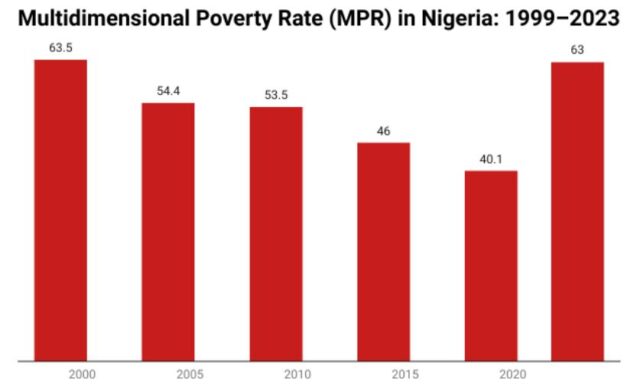Lack of Data Leaves Millions of Poor Nigerians Behind
Decades of Economic Reform Fall Short
Nigeria has experienced various economic reforms, from the Structural Adjustment Programme (SAP) of the 1980s to the recent Renewed Hope Agenda. Each reform was designed to pull the nation out of economic stagnation. Yet, policies such as Vision 2010, NEEDS, and the Economic Sustainability Plan (ESP) have failed to deliver widespread benefits, leaving millions of Nigerians in poverty. A primary reason is the absence of data to ensure policies align with the realities of those most in need.
The Disconnect Between Policies and Reality
Most policies in Nigeria are designed without proper data on the population they are meant to serve, resulting in ineffective solutions. This was evident in the 2023 removal of fuel subsidies, which was intended to free up funds for critical infrastructure and social welfare programs. Unfortunately, without accurate information on energy consumption and income levels, many low-income Nigerians faced increased fuel prices without sufficient compensation. Inflation remains high, and the poor continue to struggle despite the National Bureau of Statistics (NBS) reporting a slight decrease in inflation from 33.4 percent to 32.15 percent in August.
A Persistent Data Gap: The Numbers Tell the Story
According to the NBS, over 133 million Nigerians (63% of the population) are multidimensionally poor, meaning they lack access to essential services like food, healthcare, education, and sanitation. Despite this staggering number, programs like the National Social Investment Programme (NSIP) are underfunded and reach only a fraction of those in need. In 2022, only ₦500 billion ($1.2 billion) was allocated to social investment programs, a mere 0.27% of Nigeria’s GDP. Worse still, inefficiency and corruption limit the funds’ impact, as evidenced by a 2023 World Bank report which revealed that only 1.25% of the population benefitted from the Conditional Cash Transfer program.

Economic Reforms Without Safety Nets
Another example of data-driven oversight is the unification of the naira exchange rate in 2023. While the policy aimed to attract foreign investment, it also led to the highest inflation rates in 28 years, primarily due to rising food prices. With no adequate safety nets, the poor felt the brunt of this economic shock, revealing the risks of implementing reforms without the necessary safeguards in place.
Nigeria Social Media Reactions to Data Gaps in Economic Reforms
- @AyoPovertyWatcher: “Nigeria’s safety nets are weak because of poor data. No wonder the poor keep getting poorer. #EconomicReform”
- @GracePolicyAnalyst: “How can we fix poverty without proper data? 133 million Nigerians still suffering, and our safety nets are failing. #NigeriaPolicy #DataMatters”
- @NaijaEconObserver: “Removing fuel subsidies was supposed to help, but without data, it’s hurting low-income Nigerians even more. #EconomicReformGoneWrong”
- @BolaSaysNG: “Why is it that every reform misses the poor? Data collection is not just a luxury, it’s a necessity. #PovertyInNigeria”
- @SuleimanEcon: “133 million Nigerians living in poverty but safety nets reach only 1.25% of the population? We need better planning. #NSIPFail”
- @ChidiSocialAnalyst: “The lack of data in policy-making means reforms will never work. How are we still failing the poor like this? #EconomicShame”
- @NgoziSocialChange: “If Nigeria doesn’t prioritize data, the poor will always be left behind in every reform. #DataDrivenPolicy #EndPoverty”
- @ZainabNaija: “Corruption, lack of data, and underfunded programs—how will Nigeria ever lift millions out of poverty? #SocialSafetyNets”
- @EmekaNumbers: “Inflation drops but poor Nigerians feel no relief. We need reforms built on real data, not assumptions. #NBS #NigeriaEconomy”
- @FemiDataAnalyst: “Without proper data, our safety nets are leaving millions to suffer. Can we focus on actual needs for once? #PolicyChange”
- @IfySocialJustice: “Safety nets like NSIP are a joke without accurate data to target the right people. Time to get serious, Nigeria! #FightPoverty”
- @TundeNairaTalk: “Naira unification hit hard, but where were the safety nets? Without proper data, reforms will always hurt the poor. #NairaCrisis”
Join Our Social Media Channels:
WhatsApp: NaijaEyes
Facebook: NaijaEyes
Twitter: NaijaEyes
Instagram: NaijaEyes
TikTok: NaijaEyes





